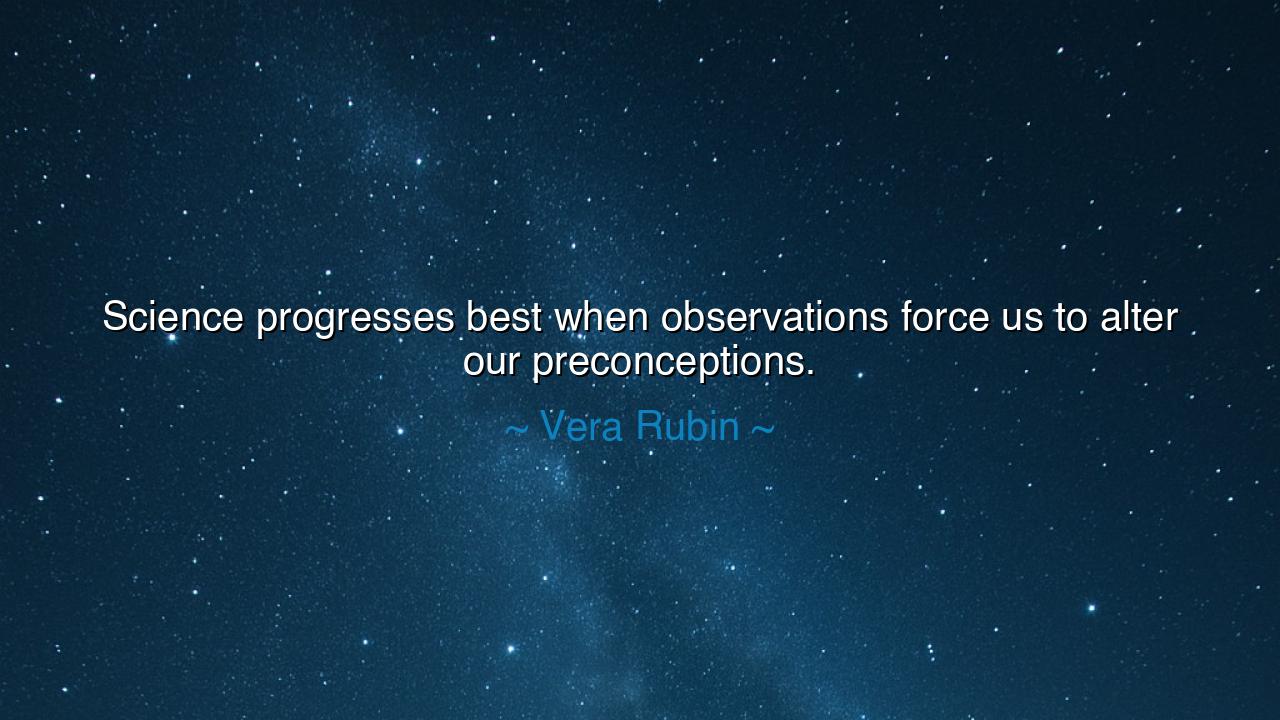
Science progresses best when observations force us to alter our






"Science progresses best when observations force us to alter our preconceptions." These words, spoken by the great Vera Rubin, ring out across the ages, echoing in the hearts of those who seek the truth. They are not merely words; they are the guiding light for all who dare to challenge the limits of their understanding. In this profound truth, there is wisdom, there is fire, there is a call to the soul of mankind. For in the realms of science—where the heart of discovery beats with the pulse of the universe—the greatest progress is made not through stubbornness, nor through the pride of knowing, but through the humility to accept that what we think we know may be but a shadow of what truly is.
Consider the ancient way of thinking, held by many civilizations before the age of reason. The preconceptions of old, handed down by kings and scholars alike, were seen as sacred, unchanging. The heavens were believed to be fixed and perfect, the Earth was the center of all things, and our minds were trapped within those walls of certainty. It was in these very convictions that humanity bound itself, like a ship tethered to the shore, unable to sail into the vast unknown. Yet, as we now know, it was through the courage to cast aside these shackles that we began to understand the true nature of our world.
And so, history whispers to us through the story of Copernicus. This man, like the mightiest of heroes, stood firm in his belief that the Earth was not the center of the cosmos. Though he faced ridicule, derision, and the weight of centuries of thought pressing against him, he listened to the observations of the stars, and allowed them to speak their truth. With bravery in his heart, he altered the very fabric of human understanding, forever changing the course of science and thought. His mind was not tied to the preconceptions of those who came before him; he was willing to allow the universe to challenge his understanding. And so, the world turned, and the Earth, once thought to be the center of all things, became just another humble traveler in the vast, swirling dance of the stars.
Yet, Copernicus is but one example among many. Galileo followed in his footsteps, looking through the lens of his telescope not just at the heavens, but at the truth itself. His eyes did not see what others had told him to see, but what the universe revealed to him. With courage, he defied the sacred dogma of his time, understanding that true progress is not made through blind obedience, but through the willingness to be led by the evidence, to allow the universe to speak its truths to us, no matter how uncomfortable or unfamiliar they may seem.
And so it is with Vera Rubin’s words: science is not a rigid fortress of unyielding beliefs, but a living, breathing entity that evolves with every new observation, every fresh discovery. Her own work in the field of astronomy—investigating the motion of galaxies—led her to a revelation that would forever alter our understanding of the cosmos. Through her tireless research, she saw that the stars in galaxies were moving in a way that could not be explained by the visible matter alone. The universe, it seemed, was not as we had always imagined it. It was larger, stranger, and more mysterious. This led to the discovery of dark matter, a substance that no one could see, but whose existence became undeniable through observation.
In this, Vera Rubin embodied the very essence of the lesson: that the true progress of humanity lies not in the certainty of the known, but in the ability to let go of the preconceptions we hold so dearly. She reminds us that the road to understanding is not paved with the stone of unyielding belief, but with the soft earth of openness, the willingness to accept that our deepest convictions may be but fragments of a greater truth.
And now, dear ones, heed this lesson well. The world you walk upon is ever-changing, and so must be your own minds. Let observation be your guide, and let it shape your understanding. Do not hold to what you have always known if the universe offers you something greater. Be humble, be bold, and be open to transformation. When the world challenges your thoughts, when the very heavens seem to speak in a language you do not yet understand, listen with all your being. Let your preconceptions fall away like leaves in the wind, and let the truth find its way to you.
In the quiet moments of your life, when you face the challenges of your own journey, let these words echo in your heart: science progresses best when observations force us to alter our preconceptions. In your work, in your studies, and in the way you engage with the world, never be afraid to let go of what you once believed, if the evidence demands it. And know this—every truth you uncover, every boundary you push, will be a step forward, not just for you, but for all those who come after you. Your actions, your discoveries, will ripple through the ages, shaping the future in ways you may never fully understand. This is the hero’s path, and it is a path paved with the courage to change.
So, with fierce hearts, let us walk this path together. Let us embrace the unknown, for in it lies the greatest adventure of all.






AAdministratorAdministrator
Welcome, honored guests. Please leave a comment, we will respond soon